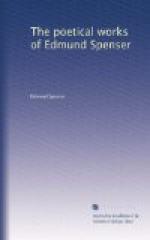I would hartily wish you would either send me the rules and precepts of arte which you obscrue in quantities, or else followe mine, that M. Philip Sidney gave me, being the very same which M. Drant deuised, but enlarged with M. Sidneys own iudgement, and augmented with my obseruations, that we might both accorde and agree in one; leaste we ouerthrowe one an other, and be ouerthrown of the rest. Truste me, you will hardly beleeue what greate good liking and estimation Maister Dyer had of your Satyricall Verses, and I, since the viewe thereof, hauing before of my selfe had speciall liking of Englishe versifying, am euen nowe aboute to giue you some token what and howe well therein I am able to doe: for, to tell you trueth, I minde shortely, at conuenient leysure, to sette forth a booke in this kinde, whyche I entitle, Epithalamion Thamesis, whyche booke I dare vndertake wil be very profitable for the knowledge, and rare for the inuention and manner of handling. For in setting forth the marriage of the Thames, I shewe his first beginning, and offspring, and all the countrey that he passeth thorough, and also describe all the riuers throughout Englande, whyche came to this wedding, and their righte names and right passage, &c.; a worke, beleeue me, of much labour, wherein notwithstanding Master Holinshed hath muche furthered and aduantaged me, who therein hath bestowed singular paines in searching oute their firste heades and sourses, and also in tracing and dogging onto all their course, til they fall into the sea.
O Tite, siquid ego, Ecquid erit pretij?
But of that more hereafter. Nowe, my Dreames and Dying Pellicane being fully finished (as I partelye signified in my laste letters) and presentlye to bee imprinted, I wil in hande forthwith with my Faery Queene, whyche I praye you hartily send me with al expedition: and your frendly letters, and long expected judgement wythal, whyche let not be shorte, but in all pointes suche as you ordinarilye vse and I extraordinarily desire. Multum vale. Westminster. Quarto Nonas Aprilis, 1580. Sed, amabo te, meum Corculum tibi se ex animo commendat plurimum: iamdiu mirata, te nihil ad literas suas responsi dedisse. Vide quaeso, ne id tibi capitale sit: mihi certe quidem erit, neque tibi hercle impune, vt opinor. Iterum vale, et quam voles soepe. Yours alwayes, to commaunde, IMMERITO.
Postcripte.
I take best my Dreames shoulde come forth alone, being growen, by meanes of the Glosse (running continually in maner of a paraphrase), full as great as my Calendar Therin be some things excellently, and many things wittily, discoursed of E. K., and the pictures so singularly set forth and purtrayed, as if Michael Angelo were there, he could (I think) nor amende the beste, nor reprehende the worst. I knowe you woulde lyke them passing wel. Of my Stemmata Dudleiana, and especially of the sundry apostrophes therein, addressed you knowe to whome, muste more aduisement be had, than so lightly to sende them abroade: howbeit, trust me, (though I doe never very well,) yet, in my owne fancie, I neuer dyd better: Veruntamen te sequor solum; nunquam vero assequar.




